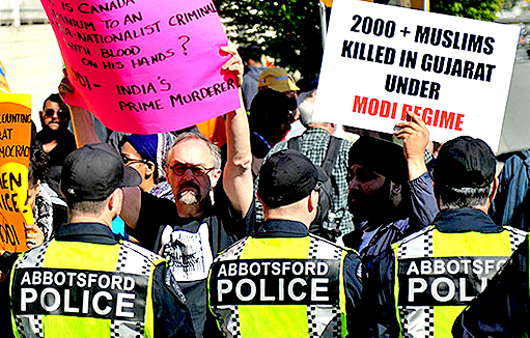Vancouver, Apr 17: Slogan-shouting and placard-waving protesters greeted Prime Minister Narendra Modi on Thursday at Canada's oldest gurdwara in Vancouver and a temple, the only sore points during a three-nation tour which resulted in ground-breaking agreements across several vital sectors.

The protests outside the Ross Street gurdwara and also the Laxminarayan temple in Surrey saw people from different communities raising issues ranging from secularism to the 2002 Gujarat riots.
The 500-odd protestors, some armed with bullhorns, claimed to represent various Indian religious groups, and held up placards relating to the 2002 Gujarat riots, which took place when Modi was the chief minister of the state.
Slogans like "Modi, Go Back" rent the air though the protest was peaceful amidst heavy police deployment and road blocks.
Some among the protesters were objecting to the presence of Canadian PM Stephen Harper for a new anti-terror law that gives sweeping powers to the police and security agencies.
Modi prayed at the gurdwara and also remembered the 1914 Komagata Maru incident when Canada did not let in hundreds of Sikhs, a community acknowledged as a major contributor to the country's economy today.
"The Sikh community has worked hard and has earned the respect of the people of Canada. India is respected in Canada and this is due to your efforts. Wherever we are, let us do things that bring pride to our nation," Modi said while addressing devotees at the Khalsa Diwan gurdwara.
Later, Modi and Harper were gifted Sikh ceremonial swords by the gurdwara committee.
"This is a very significant visit. Modi is the third Indian prime minister to come here, after Jawaharlal Nehru in 1949 and Indira Gandhi in 1973," Khalsa Diwan society president Sohan Singh Deo said.
Modi's trip to Canada is the first bilateral visit by an Indian prime minister in 42 years.
Later, the two leaders went to the Laxminarayan temple, where the number of the protestors grew as Surrey has a sizable South Asian population.
The protests evoked sharp response from supporters of Modi who chanted "Modi, Modi" while waving flags of India and Canada.
The Prime Minister also prayed at the temple, with the priest applying tika on his forehead.
"I bring greetings from 1.2 billion Indians to the 1.2 million Indians living in Canada. In India, the Supreme Court gave a superb definition for Hinduism: they said that it is not a religion but a way of life: how to live in synchrony with nature," the Prime Minister said.
The official Twitter account of the Prime Minister's Office said he also bowed in remembrance to the 1914 Komagata Maru incident, where hundreds of Sikh passengers were not allowed to alight on Canadian soil due to their Asian origin.
The Komagata Maru was a Japanese steamship, which was sailing from Hong Kong to Vancouver with 376 passengers from Punjab on board, a majority of whom were Sikhs. Only 24 were admitted to Canada, while the rest were forced to return to India.
Modi wrapped up his engagements in Canada with a state banquet hosted by the Canadian Prime Minister.
Talking business
Earlier, top executives at Canada's largest banks, insurers and pension funds sounded bullish over investing in India after meeting Modi who held a roundtable with the heads of major Canadian financial institutions in Toronto.
Modi said he understood the need for consistency in regulation and that India has learnt from its past missteps.
The message resonated with Canadian business heads, some of whose firms have already lined up, or raised funds to invest in India.
"It's great to see a leader who's focused on reducing red tape, reducing roadblocks, and encouraging development," said Dean Connor, chief executive of insurer Sun Life Financial Inc that has had a presence in India for over 15 years.
Connor, noting that Modi clearly expressed that his government would not pursue retrospective application of tax rules, which has been a problematic issue for investors in the past.
Scotiabank CEO Brian Porter felt India had "great growth potential" and have been "encouraged by the significant reforms Prime Minister Modi has achieved less than one year after taking office."





Comments
Add new comment